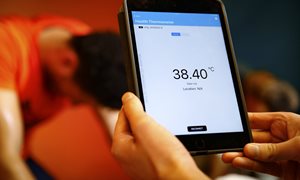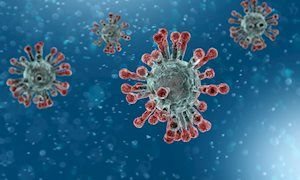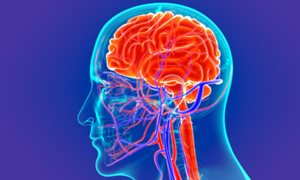 Radboudumc is combining predictive software with continuous monitoring.
Radboudumc is combining predictive software with continuous monitoring.
Since the beginning of June, patients in the Surgery and Internal Medicine departments have been connected to the new system. Instead of having them measured several times per day, a small box on the patient’s wrist continuously records their five vital functions (blood pressure, heartbeat, temperature, respiratory rate, and oxygen intake.) Both patients and healthcare providers are enthusiastic about this. Patients are indicating that it enables them to ask the right questions, because it provides them with more insight into the progress of their health.
Physicians and nurses are noticing that they also interact with this information differently. They no longer look at the blood pressure, heartbeat, and respiratory frequency, but instead assess the trends in those readings and adapt their actions accordingly. For instance, as sepsis develops, heartbeat and temperature increase while blood pressure drops (see Figure 1). Since one does not spend the entire day right at the patient’s bedside and there can sometimes be eight hours between measurements, gradual changes are often only discovered later. With the new predictive software, these changes can be detected several hours sooner. It is nothing but advantageous.
Alarm for needle leakage or sepsis
By monitoring continuously, you see the change in the medical situations of the patients and can intervene sooner. You can also predict who is experiencing a positive trend and can be sent home. Internist Bas Bredie: “Currently, it still costs healthcare providers a great deal of time to review all the recorded measurements and assess them as a whole. The software that we are using now and continuing to develop takes that burden off the shoulders of healthcare providers and translates the summary of that information into a new risk score. Using this score, unusual trends in the course of the illness can be detected immediately. This allows for a decline in the health of an admitted patient to be observed or predicted sooner and enables more prompt treatment. This should lead to fewer unplanned intakes to the intensive care unit (ICU), fewer extended stays at the hospital, fewer instances of CPR, and possibly even fewer deaths among patients. Using scientific research, we are attempting to make the system more specific. For example, we will soon be getting an alarm that alerts us to needle leakage or sepsis before the patient’s condition has deteriorated, which enables us to act immediately.”
Bas Bredie and his colleague, Harry van Goor, surgeon and professor of surgical education in the Surgery department, are the initiators of the research. Van Goor: “We will learn what parameters are truly important when it comes to illness and deterioration. For instance, one of the hypotheses is that of all the vital functions, variation in cardiac rhythm serves as the best predictor of how the patient’s condition will develop. One of the things that we want to investigate is whether this is actually true and to which patient groups it applies.”
Bas Bredie is member of theme Vascular damage.
-
Want to know more about these subjects? Click on the buttons below for more news.
Related news items

Grants for heart and kidney research Two awards to Radboudumc in Open Competition ENW-XS
21 July 2022Two researchers from the Radboudumc receive a grant from the NWO within the Open Competition of the Exact and Natural Sciences. They are Thijs Eijsvogels, who studies the heart, and Pieter Leermakers, who studies the kidneys.
read more
Your heart rate as a thermometer Research Olympic athletes will be followed up during 4Daagse
18 July 2022Body temperature can be determined from heart rate. This is what research by the Radboudumc among Olympic athletes shows. Athletes can use this method during training to eventually perform better in the heat. The technique is now being further investigated among participants in the 4Daagse.
read more
Young Investigator Award for Esmée Bakker
14 April 2022 Esmée Bakker received the Young Investigator Award for her abstract ‘Acute and long-term mortality rates among participants of mass-participation sports events versus the general population.’ read more
Want to be sustainable and cool? Choose fans more and aircon less Keep cool and help the environment
12 April 2022 A recent published study led by the University of Sydney, has found using indoor fans more often allows people to reduce their air conditioner use without changing how hot they feel, paving a way for reducing future energy use and greenhouse gas emissions. Coen Bongers, is one of the co-authors. read more

